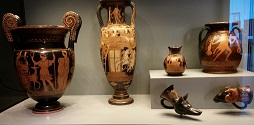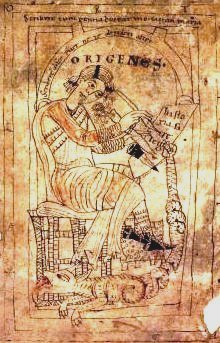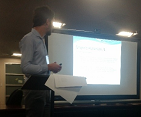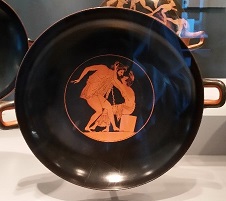Origen in Hollywood: a report of the ITN panel in Los Angeles
From June 13 to 16, 2018, the 16th Annual Conference of the International Society for Neoplatonic Studies (ISNS) took place in Los Angeles. Two of our ESRs, Giovanni and Andrea, hosted a panel on Origen and Neo-Platonism. Read the report to find out what happened there, and why Los Angeles was such a suitable occasion for the panel.

ITN Panel in Los Angeles
“The entrance to the Underworld is in Los Angeles,“ the popular author Rick Riordan wrote in his The Lightening Thief, the first novel in the Percy Jackson series (2005). The exit from Hell is in Apokatastasis - one could claim reinterpreting Origen. The father of the doctrine according to which at the end of time everyone will be saved is the perfect counterpart of the city of Angeles, and indeed Origen paid his visit to L.A. last week.
From 13th to 16th of June, the 16th Annual Conference of the International Society for Neoplatonic Studies (ISNS) took place in Los Angeles. Founded in 1973, the Society wants to promote the study of Platonism in all perspectives, investigating at the same time the philosophy of Plato himself and his influence over the centuries. During its annual conference, papers on Middle as well as Neo-Platonism, the reception of Plato in the Middle Ages as well as in the Renaissance, historical, philosophical, or literary investigations on the Platonic tradition are joined together to create a vibrant discussion among scholars with different interests and backgrounds. In occasion of this year annual conference, I and another ESR, Andrea Bianchi, have organized a panel entitled “Platonizing heresy in the early modern period: the case of Origen’s revival.”
 The panel dealt with the reception of Origen in 16th and 17th century. A controversial figure since antiquity, Origen’s influence on some of the prominent thinkers of the early modern period was strong and deep; His reception was often accompanied by a Platonizing interpretation of Christianity. For this reason, the panel investigated how certain authors interpreted Platonic philosophy in relation to the Christian religion.
The panel dealt with the reception of Origen in 16th and 17th century. A controversial figure since antiquity, Origen’s influence on some of the prominent thinkers of the early modern period was strong and deep; His reception was often accompanied by a Platonizing interpretation of Christianity. For this reason, the panel investigated how certain authors interpreted Platonic philosophy in relation to the Christian religion.
I presented the first paper in which I investigated this issue in the 16th-century philosopher and theologian, Philipp Melanchthon (1497-1560). One of the closest collaborators of Martin Luther, Melanchthon is a key figure in the history of the Protestant Reformation. In my presentation (Philipp Melanchthon and the twofold interpretation of Platonism), I argued that Melanchthon made full use of Platonism in his philosophical treatises. In Melanchthon’s eyes, philosophy has the duty to teach that exists one God, that He is good, just, and wise, and that the human soul is immortal. In his Liber de Anima, Melanchthon derived from Plato’s Phaedrus the proof of the immortality of the soul. However, philosophy cannot understand the core of Christian doctrine, that is the promise of salvation through the faith in Jesus. Theologians and philosophers must be very careful not to confuse these different fields. Heresy grows from this confusion. Melanchthon identified in Origen the first theologian who improperly mixed Platonic philosophy and Christian doctrine. In this sense, according to Melanchthon, Origen’s theology represents the point of departure from the true predication of the Apostles, the moment in which Platonic notions have begun to corrupt Christianity.
The second paper has been presented by Natalia Strok, PhD of the University of Buenos Aires and currently an assistant researcher at the National Research Council of Argentina with a project on Ralph Cudworth and the reception of the Platonic tradition. Natalia presented a paper entitled “Cudworth on the Platonic Trinity: Origen to the rescue.” One of the leading features among the Cambridge Platonists, Cudworth was a philosopher and theologian strongly influenced by Origen. In her presentation, Natalia showed how Cudworth tried to harmonize the “Platonic Trinity” with the Christian Trinity in his The True Intellectual System of the Universe. In order to achieve this goal, Cudworth drew from Origen’s Peri Archòn to explain in what manner the third hypostasis in the Christian Trinity, that is the Holy Spirit, can be understood as the Platonic “soul of the world.”
 Finally, the ESR Andrea Bianchi, PhD Candidate at the Catholic University in Milan, presented a paper on the Arminian Biblical scholar Jean Le Clerc (1657-1736). In his presentation, entitled “’Handle with care’: Jean Le Clerc and the threat of Origen’s Platonism,” Andrea analyzed the reception of Origen in Le Clerc. According to Le Clerc, Origen was fully immersed in Platonism, and, because of this, the Alexandrian theologian represents a threat to Christianity. However, despite his overall negative reception of Origen, Le Clerc argues that, if “handled with care,” Origen’s Platonism can be fruitful to understand the Christian message.
Finally, the ESR Andrea Bianchi, PhD Candidate at the Catholic University in Milan, presented a paper on the Arminian Biblical scholar Jean Le Clerc (1657-1736). In his presentation, entitled “’Handle with care’: Jean Le Clerc and the threat of Origen’s Platonism,” Andrea analyzed the reception of Origen in Le Clerc. According to Le Clerc, Origen was fully immersed in Platonism, and, because of this, the Alexandrian theologian represents a threat to Christianity. However, despite his overall negative reception of Origen, Le Clerc argues that, if “handled with care,” Origen’s Platonism can be fruitful to understand the Christian message.
In general, the panel circled around the relationship between Platonism and Christianity, through the specific case of the reception of Origen. Some authors (for instance, Philipp Melanchthon and Jean Le Clerc) rejected Origen’s theology and recognized in his thought a source of corruption for Christian doctrine precisely because of his Platonism; on the opposite, others thinkers (like Rulph Cudworth) appreciated Origen’s Platonism and drew from Origen in order to show the essential concordance between Platonism and Christianity.
 Although no one can get bored of Origen, we had some leisure time as well. On Friday 15th there was an excursion to the Getty Villa. An educational center and museum founded by the oil tycoon John Paul Getty, the Villa enumerates in his collection 44.000 Greek, Roman, and Etruscan antiquities dating from 6.500 BC and 400 AD. Moreover, in that very same days, the Villa was hosting an exhibition on Plato, which made our visit even more interesting
Although no one can get bored of Origen, we had some leisure time as well. On Friday 15th there was an excursion to the Getty Villa. An educational center and museum founded by the oil tycoon John Paul Getty, the Villa enumerates in his collection 44.000 Greek, Roman, and Etruscan antiquities dating from 6.500 BC and 400 AD. Moreover, in that very same days, the Villa was hosting an exhibition on Plato, which made our visit even more interesting.
In general, the participation in the conference was a very enriching experience. Senior researchers, as well as PhD students, presented their research on different authors (Plato, Iamblichus, Proclus, Plotinus, Marsilio Ficino, Giovanni Pico della Mirandola, and Origen as well), the following Question & Answer time was always fruitful and interesting, a friendly environment helped to share ideas and engage in stimulating discussions. Origen, Plato, and vibrant academic confrontations were the main ingredients of four lovely days in Los Angeles.
Giovanni Tortoriello